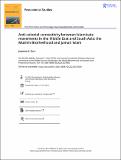Files in this item
Anti-colonial connectivity between Islamicate movements in the Middle East and South Asia : the Muslim Brotherhood and Jamati Islam
Item metadata
| dc.contributor.author | Gani, Jasmine K. | |
| dc.date.accessioned | 2022-10-25T08:30:03Z | |
| dc.date.available | 2022-10-25T08:30:03Z | |
| dc.date.issued | 2023-02-28 | |
| dc.identifier | 281588997 | |
| dc.identifier | 051d4407-33df-476e-9eef-1538640232a3 | |
| dc.identifier | 85143605656 | |
| dc.identifier | 000870892800001 | |
| dc.identifier.citation | Gani , J K 2023 , ' Anti-colonial connectivity between Islamicate movements in the Middle East and South Asia : the Muslim Brotherhood and Jamati Islam ' , Postcolonial Studies , vol. 26 , no. 1 , pp. 55-76 . https://doi.org/10.1080/13688790.2023.2127660 | en |
| dc.identifier.issn | 1368-8790 | |
| dc.identifier.other | ORCID: /0000-0002-8218-1807/work/121312560 | |
| dc.identifier.uri | https://hdl.handle.net/10023/26238 | |
| dc.description.abstract | With almost every part of the Muslim world having suffered from European colonisation, the roles and relations of Islamicate movements in anti-colonial history cannot be ignored. And yet, despite intellectual overlaps, mutual opposition to British colonialism, and a shared spiritual worldview, little has been written within postcolonial studies on the historical relationship between the Muslim Brotherhood in Egypt and Jamati Islam in South Asia. I explore the link between both movements as an example of anti-colonial connectivity that transcended territory. Though disconnected by geography and language, both groups were nevertheless tied by the deep connection of a shared belief system and the common experience of British imperialism. In particular, I argue their theology was not incidental but fundamental to both their anti-colonialism and their connectivity. I consider how that connectivity and solidarity evolved through time and shifting locations, reflecting the rich inheritance not just of post-colonies, but also of diasporic communities in the imperial metropole, inhabiting liminal spaces of unbelonging who often found community via these transnational movements. The purpose of the article is a recovery of history and a recognition of (at times overlooked) anti-colonial struggles and solidarities that do not fit neatly within disciplinary postcolonial norms. | |
| dc.format.extent | 22 | |
| dc.format.extent | 1893964 | |
| dc.language.iso | eng | |
| dc.relation.ispartof | Postcolonial Studies | en |
| dc.subject | Anti-colonialism | en |
| dc.subject | Al-Banna | en |
| dc.subject | Mawdudi | en |
| dc.subject | Islamicate | en |
| dc.subject | Ummah | en |
| dc.subject | JZ International relations | en |
| dc.subject | BP Islam. Bahaism. Theosophy, etc | en |
| dc.subject | T-NDAS | en |
| dc.subject | MCC | en |
| dc.subject.lcc | JZ | en |
| dc.subject.lcc | BP | en |
| dc.title | Anti-colonial connectivity between Islamicate movements in the Middle East and South Asia : the Muslim Brotherhood and Jamati Islam | en |
| dc.type | Journal article | en |
| dc.contributor.institution | University of St Andrews. School of International Relations | en |
| dc.identifier.doi | 10.1080/13688790.2023.2127660 | |
| dc.description.status | Peer reviewed | en |
This item appears in the following Collection(s)
Items in the St Andrews Research Repository are protected by copyright, with all rights reserved, unless otherwise indicated.

